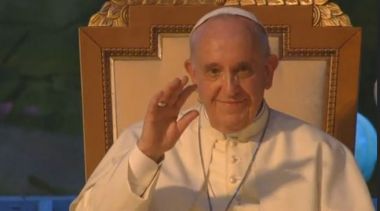Pope Francis' call for 'peace and reconciliation' is bearing fruit in Korea

North and South Korea have agreed a peace deal, one year after the Pope held a Mass for Peace and Reconciliation in Seoul.
Tensions at the border led to a brief exchange of fire last week after a mine was detonated, wounding two South Korean soldiers.
The North initially denied planting the mine but has recently agreed to express "regret," leading to the deal. In return, the South has halted its propaganda broadcasts into North Korea, a practice they had resumed in retaliation to the land mine.
The diffusion of tensions occurred almost exactly one year after the Pope visited South Korea, aiming to promote reconciliation between the North and South, which have officially been at war since 1950.
Pope Francis asked Koreans to "bear convincing witness to Christ's message of reconciliation in your homes, in your communities and at every level of national life."
"I am confident that, in a spirit of friendship and cooperation with other Christians, with the followers of other religions, and with all men and women of good will concerned for the future of Korean society, you will be a leaven of the Kingdom of God in this land," he added.
The extent to which this message has had an effect remains debatable, but there are encouraging signs.
Yesterday's deal "could serve as an occasion to resolve all inter-Korean issues through trust," South Korea's President Part Geun-hye said.
Both countries have also agreed to work together towards a resumption of the reunion of families separated by the 1950-53 Korean War, an ongoing point of contention.
The Catholic Church has grown significantly since the Korean War, prompting some Catholics to hope their presence will foster a growing culture of reconciliation, as the Pope suggested one year ago.
In 1960 there were around 500,000 Catholics in South Korea – less than two per cent of the population. There are now 5.5 million Catholics, making up 11 per cent of the population.











